How can I get a high score on the Duolingo English Test?
At Arno, we've helped over 200,000 students get ready for the DET, and in this article, I'm going to share the pieces of advice that our students have found the most useful in raising their DET scores.
Let's jump in!
Table of Contents
- Identify your areas for improvement
- Learn strategies for each question type
- Practice writing and speaking not comprehension
- Study picture description
- Avoid basic grammar mistakes
- Learn advanced vocabulary
- Learn connecting words
- Learn how to organize your responses
- Speak in the right way
- Read and listen to English

1. Identify your areas for improvement
If you have already taken the Duolingo English Test, then you know your scores. To improve, you should focus on your lowest subscores. The lower a score, the faster it can improve. For example, improving from 75 to 85 is easier than improving from 85 to 95.
But if you have not taken the DET, then you can figure out how much you need to improve by taking mock tests. There is the official mock test from Duolingo, which is slightly shorter than the real one. It's great because it's free and you can take it as many times as you like. However, it only gives you an estimated overall score.
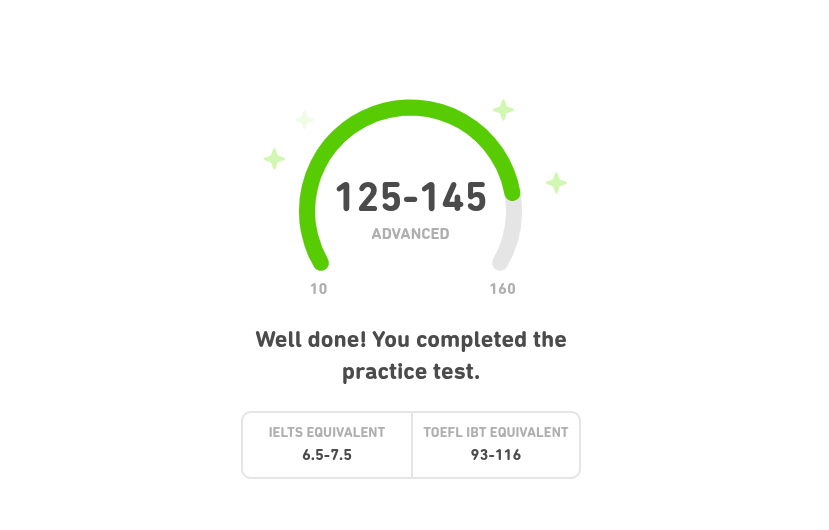
This means that you can't see which areas you should focus on. This is why we built a full mock test inside of Arno. Our mock tests are full-length and the questions are just like you will see on the real test. We also give you detailed scoring and feedback on every one of your responses. Every new user gets one mock test for free! Just click here to create your free account.
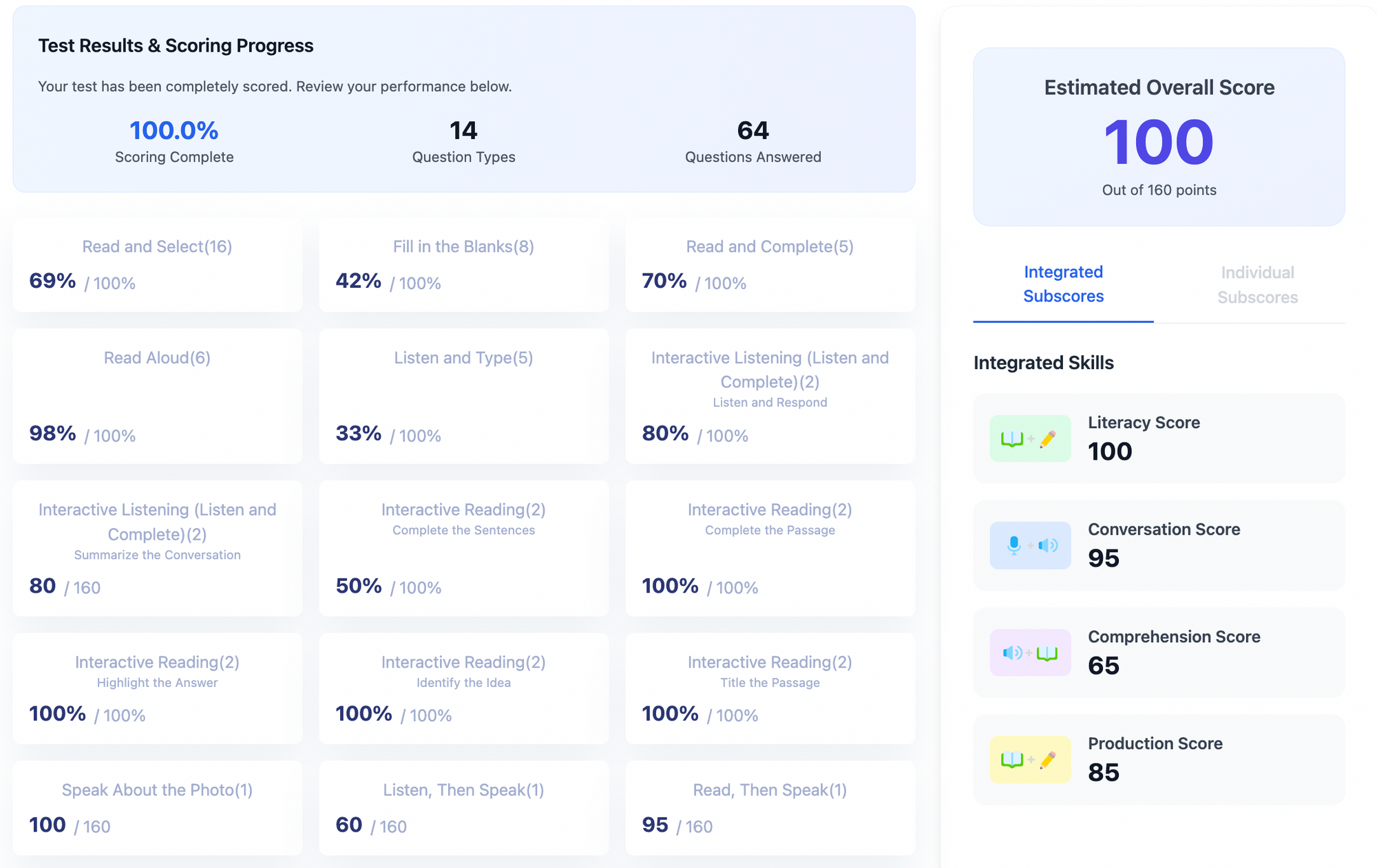
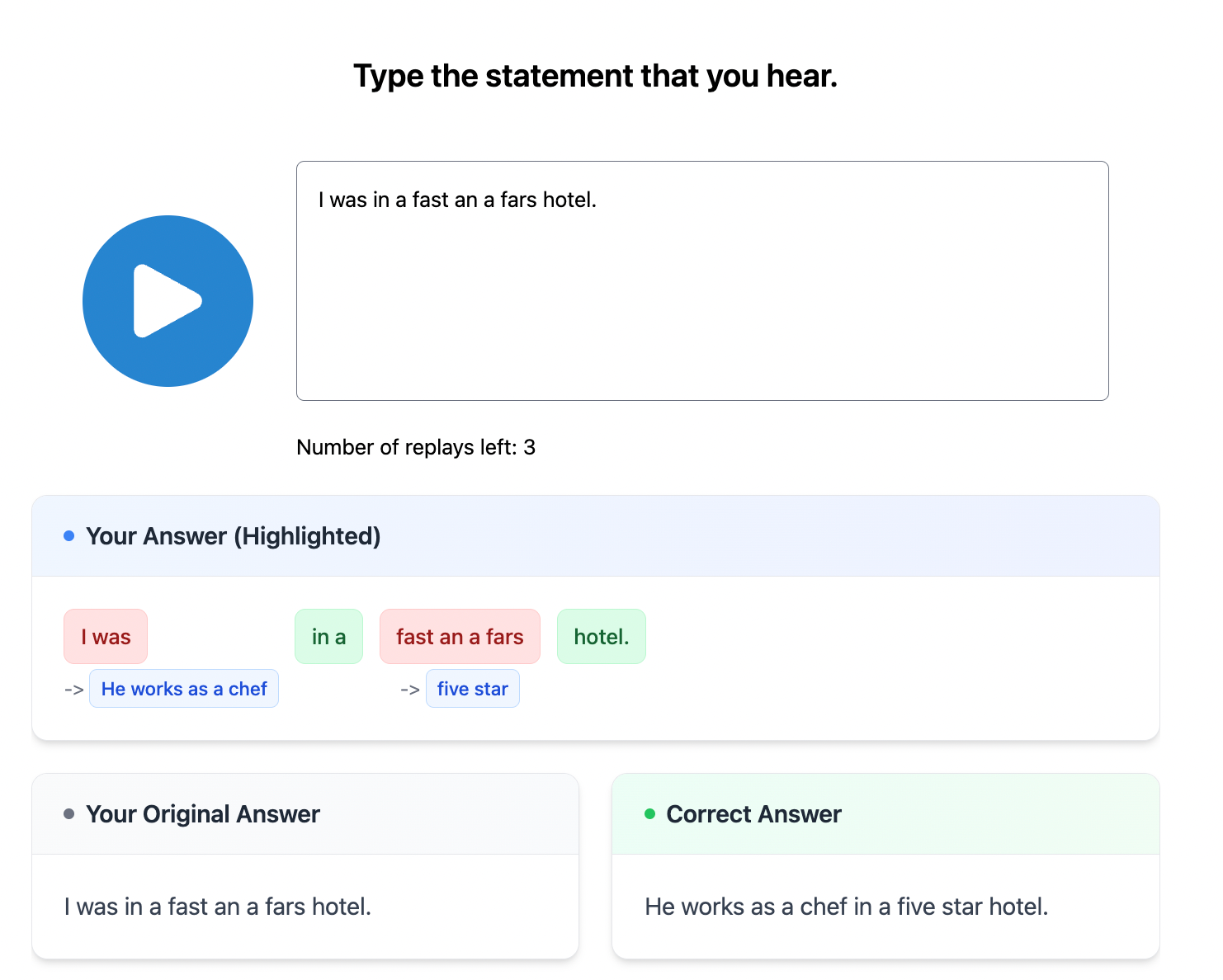
2. Learn strategies for each question type
Before you take the test, you should become familiar with every question type. On the test, you should recognize every question and know exactly what to do as soon as you see it. This is especially important because the DET is such a quick test. You don't want to have to spend valuable time reading instructions.
We also have a video that covers the same material:
Once you understand how each question type works, you should learn strategies that will help you to get the highest score. For that, we have a ton of free resources on our YouTube channel. We've put all our masterclasses for different questions types in this playlist:
3. Practice writing and speaking, not comprehension
Most students will find it easiest to improve their writing and speaking scores. This is because when we write or speak, we use the same words and structures and over. You can learn some advanced vocabulary and advanced structures that you can use in multiple responses to quickly raise your score. For example, in the video below you can learn 5 words that allow you easily form complex sentences:
In contrast, comprehension is much harder to improve quickly. This is because there are so many English words that could appear in questions like Read and Select or Fill in the Blanks that test your comprehension. The probability is low that you memorize a word that you will see in one of these questions.
Also, by working on your writing and speaking, you will also improve your ability to read and listen. In other words, focusing on Production will likely raise your other subscores as well.
In the next tips, we're going to look at how exactly to improve your writing and speaking.
4. Study picture description
Improving at picture description is the easiest way to improve your Production score on the Duolingo English Test. This is because we don't get much practice describing images in ordinary life. Even if you ask someone who is completely fluent in English, they will struggle to describe an image in detail for 90 seconds. By learning some some specific strategies and vocabulary, you can quickly and significantly improve at picture description.
In addition, there are 4 picture description questions on the test. For 3, you have to write about the photo and for 1, you need to speak about the photo. This means that picture description is a large part of how writing and speaking is evaluated on the DET.
The most important thing to do for picture description is to learn a template or strategy that you can rely on. This will enable you to easily know what to say in your responses and ensure that you talk about the right things in order to get a high score.
To start, you should learn our very popular 3-sentence template for Write About the Photo:
(We also have the same content in a blog post: Simple Template for Write About the Photo.)
Another key aspect of doing well on picture description is to use plenty of advanced vocabulary. We also have a ton of videos about that as well which you can find in our series Score Higher on Picture Description 😁 (click here to access it).
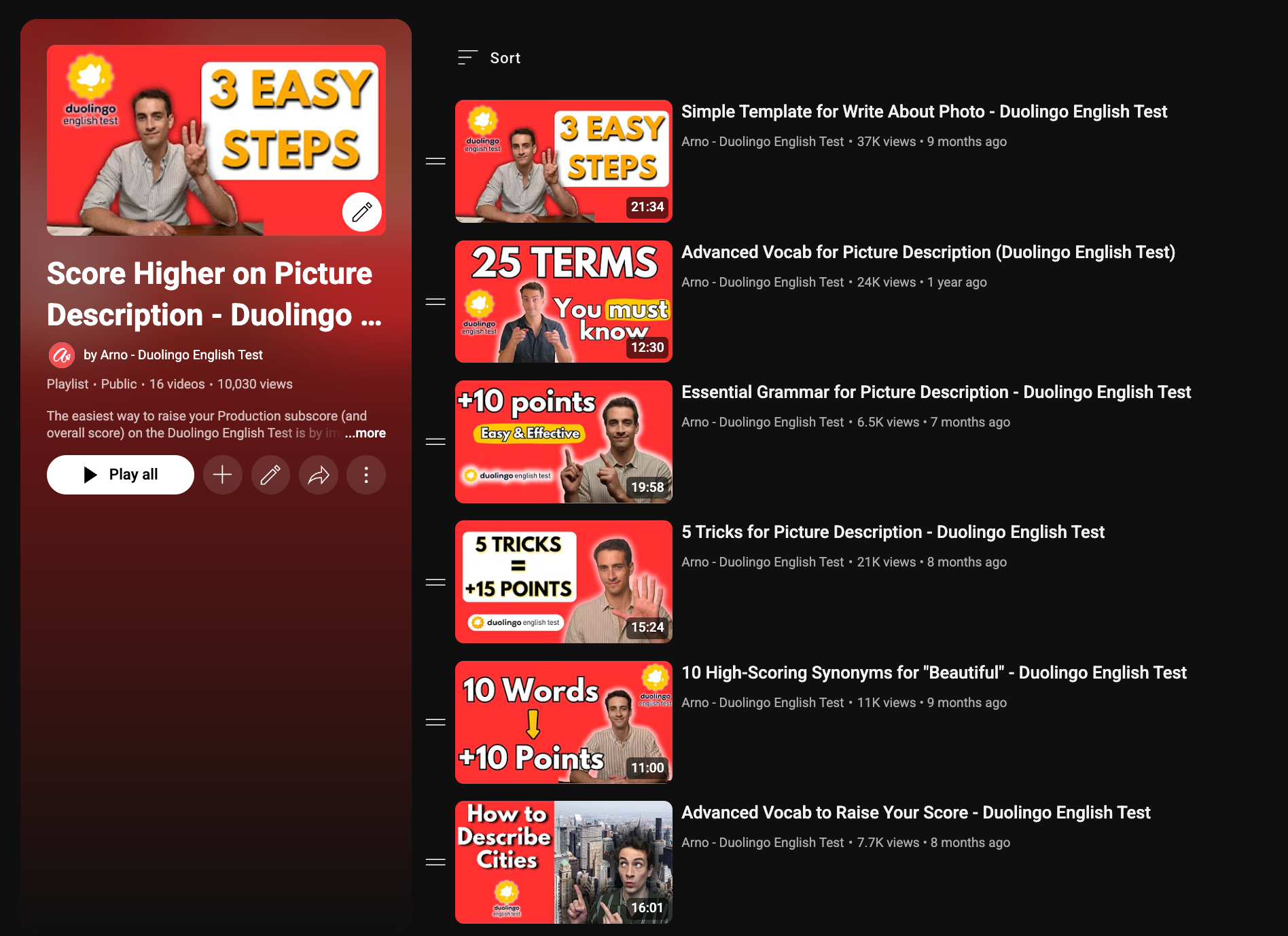
You can also find PDF printouts with information on picture description strategies and vocab on this page.
5. Avoid basic grammar mistakes
Basic grammar mistakes lose you a lot of points on the DET. However, they are also easy to avoid. As you are working on your vocabulary, you should focus on eliminating the habit of making basic mistakes.
Basic mistakes include: capitalization issues, spelling mistakes, missing words, and issues related to singular v. plural. These are considered "basic" mistakes because even people with very limited English should be able to avoid them. In the video below, I explain further what these basic mistakes are and provide examples:
At Arno, we see that many students try to learn advanced grammatical structures and advanced sentence structures before they have mastered grammar fundamentals. In effect, they are wasting their time. Even if you use advanced vocabulary and advanced grammatical structures, but your writing and speaking has many of these basic mistakes, it will be impossible to score highly.
Arno's feedback on writing and speaking questions is a great way to make sure you have a solid grasp of these basic grammar concepts. After you submit a response, Arno will identify the grammar mistakes and then allow you to correct them so that you can learn from your mistakes.

6. Learn advanced vocabulary
If you need to get 120 and above, then using advanced vocabulary is a necessity. It will not be enough to simply write clear, grammar-free responses. You also need to use advanced vocabulary (and advanced structures). That said, even if you don't need 120, you should still learn advanced vocabulary because it will raise your score.
However, be sure to use advanced vocabulary correctly! This is a very common mistakes among people preparing for the DET. They will learn some advanced vocabulary, but then use it incorrectly. They end up losing points by using that vocabulary, instead of gaining points! 😩
What makes one word better than another word is precision. For example, the word "good" is a word that can be used in many situations. This means that it is a basic word that many people know. It's perfectly fine to describe food as "good." However, a more precise word would be "tasty." This means that describing food as "tasty" instead of "good" on the DET will get you more points.
Here's another example. You could say that you had a "good time at the museum" but this would not earn you a lot of points on the DET. It would be better to use a more precise word like "enjoyable" and say: "I had an enjoyable time at the museum."
We've built a free Vocabulary Builder to help students learn new words 😄 To get started, you can take our free, 15-minute Vocabulary Level Assessment. It will show you the gaps in your vocabulary so that you know where to focus.
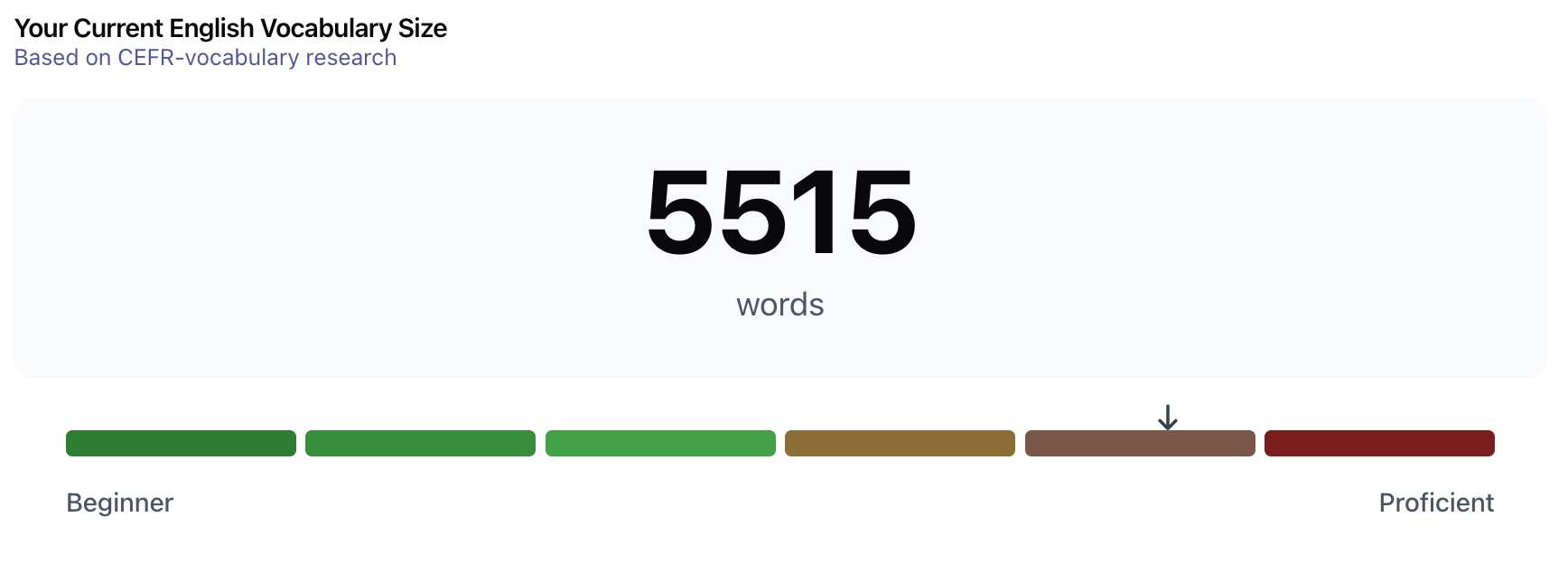
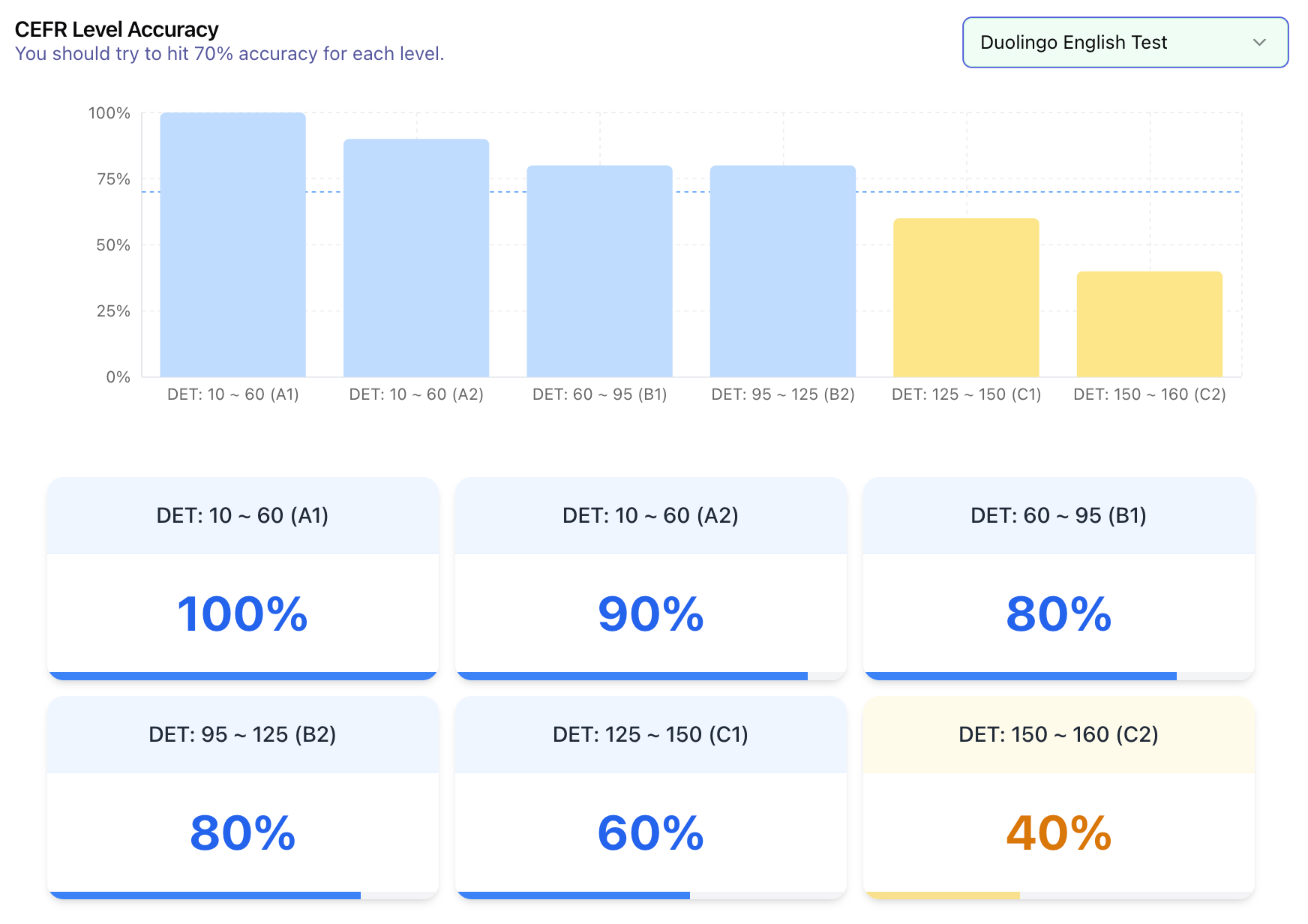
7. Learn connecting words
One kind of advanced vocabulary that you should be sure to study is connecting words. These are words that help you transition from one idea to another. They are words like, "however," "as a result," or "on the other hand."
Connecting words are great because they are not only advanced words (which means you will get more points for "vocabulary") but, they also make your reading easy to follow so they will also help you get more points on the "content" and "discourse coherence" aspects of the test.
Like for advanced vocabulary in general, it is important that you use connecting words correctly. Otherwise, you can really confuse your reader (and therefore lose a lot of points).
In the lesson below, I cover 10 of the most useful connecting words:
8. Learn how to organize your responses
For writing and speaking questions, it is important that you have a clear, neat structure to your responses. You want one idea to logically follow from the previous one. You want to use paragraphs to organize your ideas and topic sentences to begin each paragraph.
For most writing and speaking questions on the DET, you are given time to read the prompt and prepare your answer. It's crucial to use this time to effectively plan your answer. Organizing your writing can be difficult to learn, but once you understand it, it will improve your writing so much and significantly raise your score on the DET. In the lesson below, I explain exactly how to do it:
You should also learn how to write strong paragraphs. This is an essential skill for writing, and mastering it will not only help you on the DET but also in your academic and professional careers. Strong paragraphs consist of a clear topic sentence that captures the main point of your paragraph and then information that supports that main idea, like an example. It sounds simple, but it can take some practice to learn how to do well consistently. The video below is a full lesson about how to write strong paragraphs:
9. Speak in the right way
On the Duolingo English Test, you want to speak differently than you do in your everyday life. You want to speak more loudly and, likely, more slowly. When we get nervous or stressed (like when we take an important test), we naturally speak more softly and more quickly. But on the test, you need to do the opposite! On speaking questions, you should speak like you do during a presentation.
When we slow down and speak loudly, we pronounce our sounds more carefully. It makes our voice easier to hear in the recording. It also gives us more time to think about what to say. If you are speaking really quickly, it means that you have to think really quickly too! By slowing down your speech, you can relax and think more clearly about what to say next without needing to rush.
👉 For more tips for speaking questions, check out our other article Ultimate Guide to Speaking Questions on the Duolingo English Test and check out our lesson below:
10. Read and listen to English
It's important to recognize that preparing for an English test is different than the process of preparing for other tests. On other tests, you can cram and memorize a bunch of information in a short amount of time. To an extent, you can cram for an English test by learning strategies and specific vocabulary that you can use to get a higher score. However, at a certain point, the only way to raise your score will be by improving your English. That takes time. Learning a language is like preparing for a marathon. You have to train consistently for weeks and months.
You definitely should answer practice questions and take mock tests to get ready for the test. But you should also try to consume English on a daily basis. Thankfully, this is very easy. For example, to listen to more English, just watch American TV shows. Really, watching TV will improve your English a lot! Your comprehension will improve. You will learn new words. You will find that your speaking improves as well.
You should also try to read English on a daily basis. The easiest thing to do is to get your news in English. We recommend the BBC because it's free, high-quality, and they cover so many different topics. You can read about what is interesting to you.
If you watch 1 hour of English-language TV and read English for 30 minutes per day, after even just 1 week, you will notice a difference in your English abilities.
To start practicing for the DET, you should create your Arno account. With a free account, you can practice every question type as much as you like for free. Just click the link below to get started!
